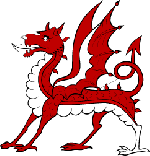Dragon: Difference between revisions
mNo edit summary |
No edit summary |
||
| (6 intermediate revisions by 5 users not shown) | |||
| Line 1: | Line 1: | ||
[[Image:Dragon statant.png|150px|right]] |
|||
| ⚫ | |||
==European Dragons== |
|||
| ⚫ | |||
| ⚫ | |||
There are also dragons in Chinese, Korean and Oriental heraldry. |
|||
These dragons have no wings, and 5, 4 and 3 toes respectively, but [[SCA]] [[heraldry]] requires they are depicted with 3 toes or less. |
|||
| ⚫ | |||
Sea dragons have no wings. |
|||
Wingless dragons exist in [[England|English]] [[folk-lore]]: often they are alternatively referred to as '''wyrms'''. The wingless variety seen in [[German]] heraldry is called the [[lindwurm]]. |
|||
==Oriental Dragons== |
|||
There are also dragons in Chinese, Korean and [[Oriental heraldry]]. These dragons have no wings, and a varying number of toes. Only the dragons used by the Emperors of [[China]] and [[Japan]] were permitted to be depicted with five toes; this is comparable with the [[Rome|Roman]] and [[Byzantine]] practice of restricting [[poryphyry]] to any but the Emperor, or the medieval European practice of reserving [[ermine]] to the nobility. |
|||
==Dragons in SCA Heraldry== |
|||
Dragons are common in [[SCA]] [[heraldry]], but it is a requirement that Oriental dragons be depicted with 3 toes or fewer. |
|||
A dragon [[passant]] [[vert]] appears on the arms of the [[Midrealm]]. |
|||
In SCA [[heraldry]], dragons are considered the same as [[wyvern]]s. In fact, [[wyvern]] is the more common form of the beast in [[period]] [[heraldry]], especially in early heraldry. |
|||
==See Also== |
|||
* [[Dragon (Maplet)|Dragons according to Maplet's A Greene Forest]] |
* [[Dragon (Maplet)|Dragons according to Maplet's A Greene Forest]] |
||
[[category:device heraldry]] |
|||
Latest revision as of 17:06, 22 August 2008
European Dragons
The heraldic dragon is a 4-legged beast with a horny head, barbed tongue, scaly back, armoured rolls on the chest and belly, 2 bat-like wings, 4 legs with talons like an eagle�s, and a pointed tail often with an arrow-like end.
It is usually shown rampant, statant or passant, and rarely displayed like an eagle.
Wingless dragons exist in English folk-lore: often they are alternatively referred to as wyrms. The wingless variety seen in German heraldry is called the lindwurm.
Oriental Dragons
There are also dragons in Chinese, Korean and Oriental heraldry. These dragons have no wings, and a varying number of toes. Only the dragons used by the Emperors of China and Japan were permitted to be depicted with five toes; this is comparable with the Roman and Byzantine practice of restricting poryphyry to any but the Emperor, or the medieval European practice of reserving ermine to the nobility.
Dragons in SCA Heraldry
Dragons are common in SCA heraldry, but it is a requirement that Oriental dragons be depicted with 3 toes or fewer.
A dragon passant vert appears on the arms of the Midrealm.
In SCA heraldry, dragons are considered the same as wyverns. In fact, wyvern is the more common form of the beast in period heraldry, especially in early heraldry.
